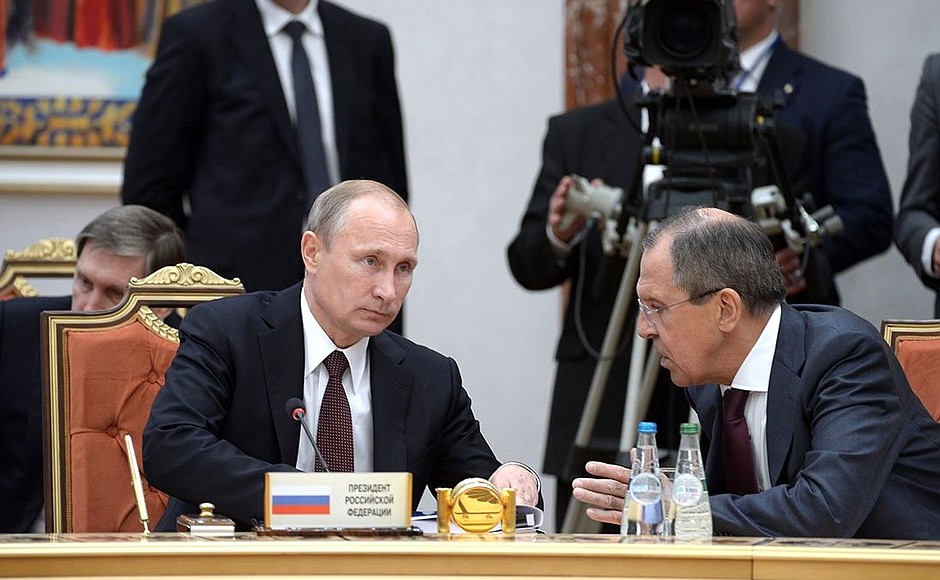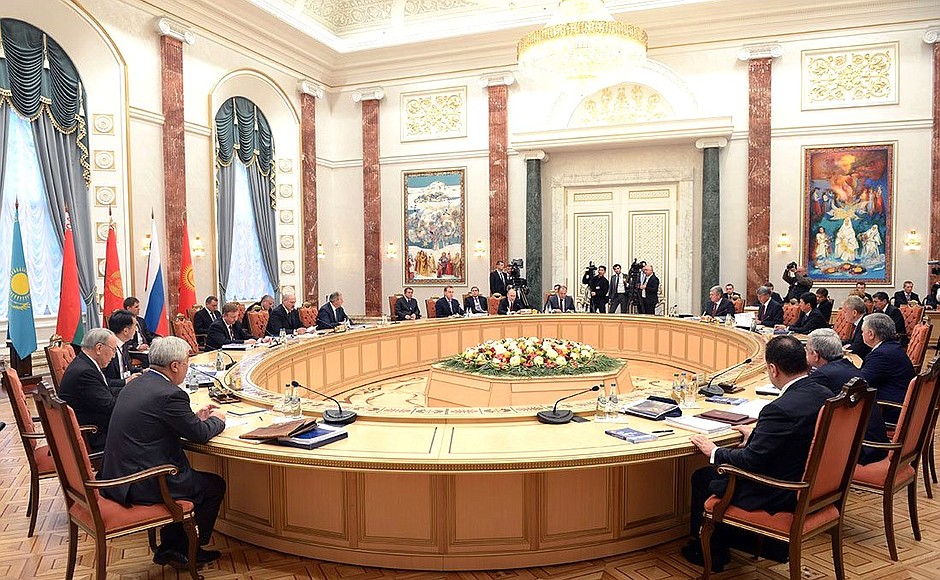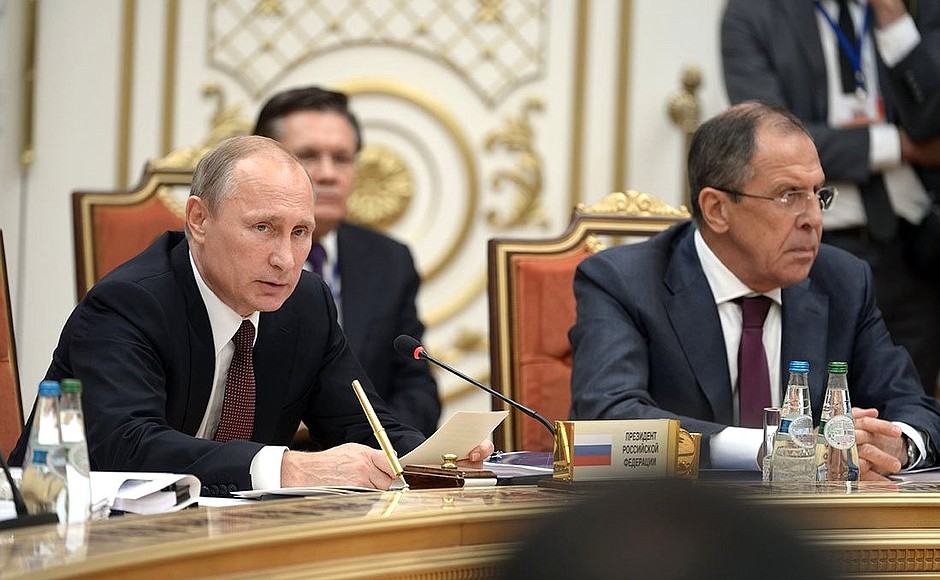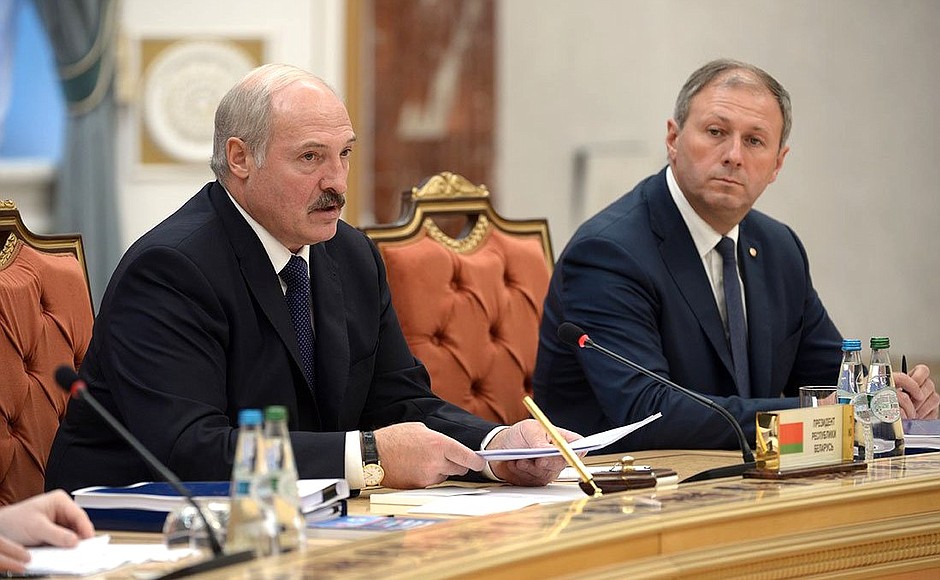See also
The presidents of Belarus, Kazakhstan, Russia and Armenia discussed current financial, organisational and technical matters related to the start of the Eurasian Economic Union’s work on January 1, 2015.
* * *
Opening remarks at the Supreme Eurasian Economic Council summit meeting
President of Russia Vladimir Putin: Colleagues,
Russia, Belarus and Kazakhstan are making steady progress on the Eurasian integration track. Our parliaments timed the ratification of the Treaty on the Eurasian Economic Union for this meeting in Minsk. As we agreed, the Eurasian Economic Union will start work on January 1, 2015.
This marks our transition to a new and higher integration stage that will make us more effective in modernising our countries’ economies and making them competitive. We will carry out a coordinated policy in the key industrial sectors, energy, and agriculture. We will remove the barriers in the way of free movement of goods, services, capital and labour. The common Eurasian market will start to operate according to universal, transparent and clear rules based on the World Trade Organisation’s regulations and principles.
Our integration project is already producing practical results. Trade within the Customs Union has increased by 50 percent since July 1, 2011, and now comes to more than $64 billion. We have improved our trade structure. Processed goods have gradually started replacing raw materials. Their share has risen considerably, while the share of raw materials has fallen from 40 percent to 28.9 percent.
It is very important that the public in our countries broadly supports this policy of closer integration. Public opinion surveys carried out by the Eurasian Development Bank show that 79 percent of people in Russia, 68 percent of people in Belarus, and 84 percent of people in Kazakhstan take a positive view of the Customs Union’s work. We need to repay this very high level of trust with tangible results and continued improvements in the wellbeing and living standards of our peoples.
Colleagues, we will sign today the agreement on Armenia’s accession to the Eurasian Economic Union. I hope that our countries’ parliaments will put in just as coordinated an effort to approve it by the end of the year.
We think that Armenia is ready for working in the Eurasian Economic Union on an equal footing with Russia, Belarus and Kazakhstan. In a relatively short space of time, starting in autumn 2013, our Armenian friends have brought their economic regulations into line with our common standards and their national laws into line with our organisation’s rules.
We hope to see positive macroeconomic effects in the first year or two following Armenia’s accession. Our three countries’ trade with Armenia is growing fast as it is and has been adding up to 10 percent every year. Removing trade and administrative barriers will, I hope, only further consolidate this trend. Other key indicators such as GDP, consumer demand, real incomes, and employment should also improve.
Today, we will approve the roadmap for Kyrgyzstan’s integration into the Common Economic Space. It will complement the plan for adapting Kyrgyzstan’s economy to the Customs Union standards, which was adopted at the May summit in Astana.
We understand that our colleagues in Kyrgyzstan need help in improving national laws and carrying out structural transformation. Russia already provides such assistance through our bilateral agreements. We hope to combine our efforts with those of our Belarusian and Kazakhstani partners.
Aside from Armenia and Kyrgyzstan, other countries and regional organisations are also showing interest in working with the Eurasian Economic Union. The Eurasian Economic Commission has already received several dozen proposals for establishing preferential trade regimes.
We think we should work more actively on this external relations dossier. In particular, we could soon complete talks on a draft agreement on a free trade zone with Vietnam, step up expert consultations with Israel, India and Egypt, and continue developing the dialogue with the Common Market of the South (Mercosur) and with ASEAN.
I want to say a few words about relations with our neighbour, Ukraine, in light of the EU Association Agreement it has signed.
The heads of state of our three countries met here in Minsk in August with the Ukrainian President and EU representatives. Kiev and Brussels listened to our arguments and decided to postpone implementation of the Association Agreement’s economic part until December 31, 2015. We now have the possibility of making adjustments to provisions in the agreement that could cause considerable damage to the economies of the Customs Union countries and to our traditional trade ties with Ukraine. Of course, these talks will not be easy and we will need to take a consolidated position so as to convince our partners to stop making it an either-or choice between European and Eurasian integration and choose instead to link the two projects together.
Colleagues, I want to say again that Eurasian integration is taking on objectively ever greater importance in our countries’ lives. This requires us all to coordinate our work even more closely and make sure that we keep up the pace. We still need to approve around 50 documents on financial and organisational aspects of the Eurasian Economic Union’s work by the end of the year.
I propose that we hold our next meeting in December in Moscow, to conclude the preparations. I have already discussed this with President of Kazakhstan Nursultan Nazarbayev and President of Belarus Alexander Lukashenko, and now I want to say it officially at our meeting. I want to thank you all too for your attention.
Thank you very much.



